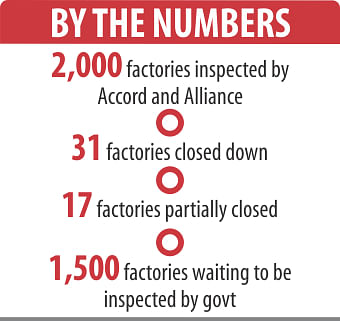GSP fate hangs in the balance
Uncertainty has arisen centring the reinstatement of a trade privilege in the US market, as the Obama administration has once again asked Bangladesh to improve workplace safety and ensure workers' rights at factories.
After an interagency review, the United States Trade Representative (USTR), America's chief trade negotiator, yesterday said Bangladesh has made progress over the last one year to address fire and building safety issues in the garment sector.
But, further progress is needed to get back the generalised system of preferences, the USTR said.
After two industrial disasters -- Tazreen Fashions fire and Rana Plaza building collapse, the US suspended GSP for Bangladesh in June 2013, citing serious shortcomings in labour rights and workplace safety.
GSP is a trade scheme under which the US allows import of more than 5,000 goods from 122 least developed and developing countries with lower or zero-duty benefit.
The US introduced the GSP in 1976 under the US Trade Act of 1974. However, the GSP scheme has remained suspended for all beneficiary countries since July 31, 2013.

Although Bangladesh used to export a very small quantity of goods under the GSP, still it is important for the country's image as other countries, where Bangladesh enjoys such benefit, might be influenced by the decision of the US.
“We urge the government to complete remaining factory inspections as soon as possible to prevent recurrence of workplace tragedies such as those that occurred in 2012 and 2013,” USTR chief Michael Froman said in the review.
There is more work to do, building on the collaboration between the government of Bangladesh, private sector stakeholders, and the International Labour Organisation, to address the concerns about factory safety in the apparel sector, he said.
“We also urge the government to accelerate its efforts to ensure workers' rights and to take measures to address continuing reports of harassment of and violence against labour activists who are attempting to exercise their rights,” Froman said.
In 2012, the total value of US imports from Bangladesh under GSP was $34.7 million; the top GSP imports from Bangladesh included tobacco, sports equipment, porcelain china, and plastic products.
The US companies are losing $2 million a day since the suspension of the scheme for all countries, according to American Apparel and Footwear Association.
The US had tagged 16 conditions with the reinstatement of the GSP for Bangladesh. The country has submitted progress reports twice to the US, but it was not satisfied with the improvement made so far.
The USTR review said urgent progress is needed to fairly and systematically address reports of unfair labour practices and to advance and implement needed legal reforms.
The US government is concerned about continuing reports of harassment and violence against union activists seeking to establish new unions or to exercise their legal rights, it said.
The USTR review also said there has also been little progress in advancing the labour law reforms, including changes to ensure that workers are afforded the same rights and protections in export processing zones as in the rest of the country.
Under the general supervision of the Bangladesh government, more than 2,000 initial safety inspections of factories were completed in the garment sector over the last year, most by teams organised by private sector initiatives, it said.
These inspections resulted in the closure of at least 31 factories, the partial closure of 17 additional factories, and the identification of needed remedial measures in hundreds more, the USTR said.
“The government is responsible for the inspection of several hundred more factories and has hired additional inspection teams to carry out and sustain the inspection effort.”
In fiscal 2013-14, Bangladesh exported goods worth more than $5.58 billion to the US, with 95 percent of them being garment products, which were subjected to 15.61 percent duty.

 For all latest news, follow The Daily Star's Google News channel.
For all latest news, follow The Daily Star's Google News channel. 



Comments